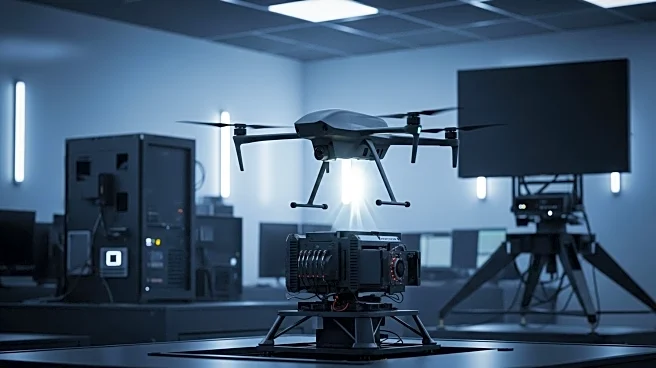What is the story about?
What's Happening?
Silicon Valley is experiencing a significant shift as venture capitalists and tech companies increasingly invest in defense startups. This change is particularly evident in Southern California, where companies like Mach Industries are gaining traction. Founded by Ethan Thornton, Mach Industries has secured $185 million in venture funding and is developing advanced military technologies, such as vertical takeoff strike aircraft. This pivot towards defense is driven by geopolitical tensions, including China's military expansion and the Russia-Ukraine conflict, which have heightened the demand for innovative defense solutions. Major tech firms like Google and OpenAI have also been awarded substantial Department of Defense contracts to enhance AI capabilities for national security. This marks a departure from Silicon Valley's historical reluctance to engage with the defense sector.
Why It's Important?
The increased investment in defense startups signifies a broader trend of integrating cutting-edge technology with national security efforts. This shift could lead to significant advancements in military technology, potentially altering the landscape of global defense. For the U.S., this means bolstering its military capabilities in response to rising geopolitical threats. The influx of venture capital into defense tech also highlights a lucrative opportunity for investors seeking high returns. However, this trend raises ethical concerns about the use of technology in warfare and surveillance, as seen in past protests against military contracts by tech workers. The growing collaboration between tech companies and the military could redefine the role of technology in national defense, impacting both the tech industry and global security dynamics.
What's Next?
As Silicon Valley continues to embrace defense startups, further investments and collaborations with the military are expected. This could lead to the development of new technologies that enhance military capabilities, such as AI-driven defense systems and advanced weaponry. The U.S. government may increase funding for defense tech initiatives, encouraging more startups to enter the sector. Additionally, ethical debates surrounding the use of technology in warfare are likely to intensify, prompting discussions on the responsibilities of tech companies in national security. The outcome of these developments could influence future defense policies and the direction of technological innovation in the U.S.
Beyond the Headlines
The pivot towards defense startups in Silicon Valley may have long-term implications for the tech industry's culture and values. Historically known for its focus on consumer technology and innovation, the region's growing involvement in defense could shift its priorities towards national security and military applications. This change might attract a new generation of entrepreneurs and engineers interested in defense tech, potentially altering the talent landscape. Additionally, the ethical considerations of using technology for military purposes could lead to increased scrutiny and regulation, affecting how tech companies operate and engage with government contracts.















